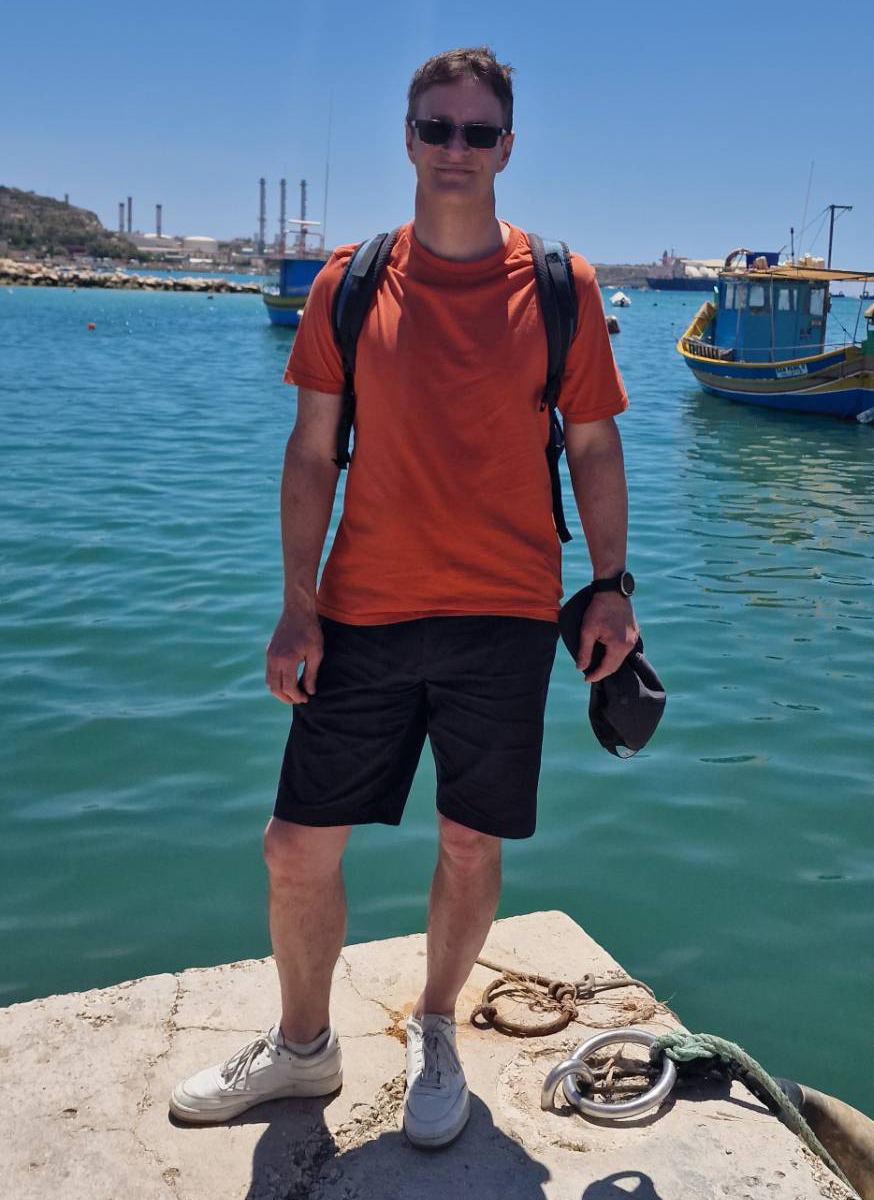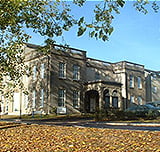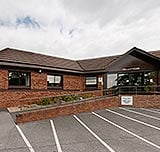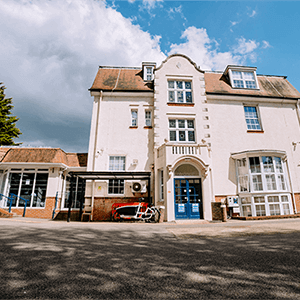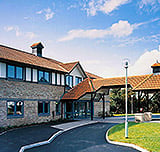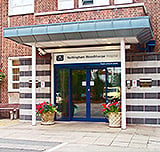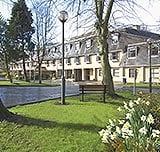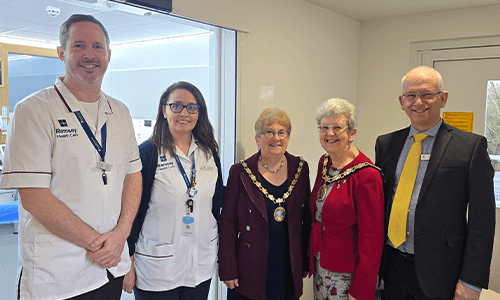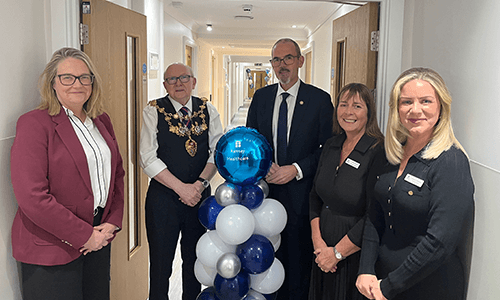
What is an enlarged prostate?
The problem is that as a man ages, the prostate tends to increase in size. This can cause the urethra to narrow and decrease urine flow. This enlarged is termed as Benign Prostatic Hyperplasia. BPH occurs when noncancerous cells of the prostate divide to make more cells. While BPH is not associated with the development of cancer, the two often go together. Distinguishing between them is an important part of the diagnosis process.
The size of the prostate can change as men get older. The cause of prostate enlargement include – Age, Obesity. Diet and Metabolic Syndrome.
What is BPH?
Benign Prostatic Hyperplasia (BPH), or an enlarged prostate, is a prostate that has grown to be larger than normal. BPH is not prostate cancer. As the prostate grows, it may constrict the urethra, making it difficult to urinate and/or apply pressure on the bladder, causing it to weaken and have difficulty emptying. Benign prostatic hyperplasia is a common condition that usually affects older men. Symptoms include hesitancy during urination, interrupted or decreased urine stream (volume and flow rate), nocturia, incomplete voiding and urinary retention.

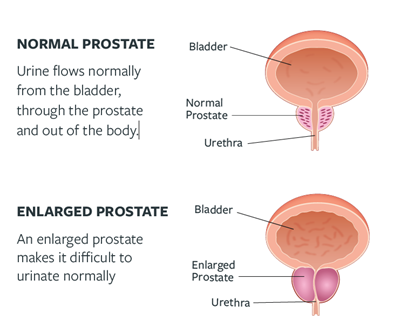
Does an enlarged prostate effect a man sexually?
BPH can cause sexual issues. The medications normally prescribed to treat BPH also have side effects of erectile and ejaculatory dysfunction.
Clinical studies show that up to 83% of men are not willing to sacrifice sexual function for symptom relief.
Size and shape of the prostate
Prostates have a few lobes, each of which can grow and cause blockage. It may be important to find out if you have an obstructive median lobe.

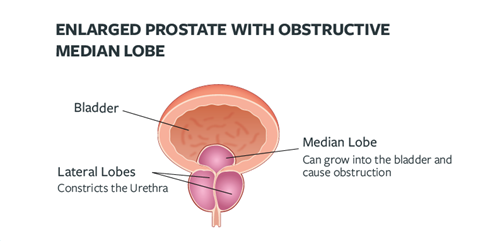
The National Institute for Health and Care Excellence (NICE) has produced guidance on Aquablation Treatment:
Aquablation robotic therapy for lower urinary tract symptoms caused by benign prostatic hyperplasia. Medtech innovation briefing [MIB315] Published: 31 January 2023.
These briefing states that:
- The technology is Aquablation robotic therapy. It is used for transurethral water jet ablation for lower urinary tract symptoms caused by benign prostatic hyperplasia.
- The innovative aspects are that transurethral water jet ablation does not use heat to remove prostate tissue and the technology can be used with prostates of any shape and size.
- The intended place in therapy would be as an alternative to standard care for people with lower urinary tract symptoms, caused by benign prostatic hyperplasia that needs surgical intervention.
- The main points from the evidence summarised in the NICE briefing are from 5 studies, which showed that Aquablation therapy is as effective, as transurethral resection of the prostate, for the removal of prostate tissue for people with benign prostatic hyperplasia.
- Experts advised that the technology is innovative compared with standard care and offers additional benefits such as an increased ability to preserve sexual function and the potential to offer day-case procedures.
NICE have previously issued guidance on:
Transurethral water jet ablation for lower urinary tract symptoms caused by benign prostatic hyperplasia. Interventional procedures guidance IPG629] Published: 19 September 2018.
Mild symptoms are usually managed conservatively using medication. If BPH symptoms are left untreated, bladder and kidney function may be impacted over time. Additionally, using medications over a prolonged period to manage BPH symptoms, may result in some side effects.
If conservative treatment is not working, or the symptoms get worse, your consultant will discuss, the surgical options available to you and the associated risks/ benefits. One of those options being: Water ablation
The procedure should only be performed by Consultants who have been trained in this procedure using the technology. A number of Ramsay Hospitals and Urology Consultants now offer the Aquablation procedure for BPH USING: ‘PROCEPT BioRobotics’ technology.
Water ablation
Computer controlled high pressure water is used to destroy some of the prostate tissue, making it smaller.
Water ablation is probably less likely to cause side effects than other a transurethral resection of the prostate (TURP) techniques.
The possible advantages of the Aquablation procedure, ‘include a reduction in resection time compared with other surgical methods, and the potential to preserve sexual function. The procedure is heat-free, which removes the risk of complications arising from thermal injury. (NICE IPG629)’.
How does aquablation therapy work?
Step 1: Creating a surgical map
Your surgeon will identify important anatomy that maintains sexual function and continence to create a personalised treatment plan, shown by the blue dotted line. The tissue inside the dotted line will be removed while the tissue outside will be left in place.

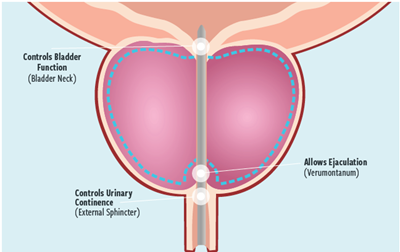
Step 2:
Once the plan is created, a robotically-controlled, heat-free waterjet removes the prostate tissue. This robotic technology ensures the prostate tissue is removed precisely, consistently, and predictably.

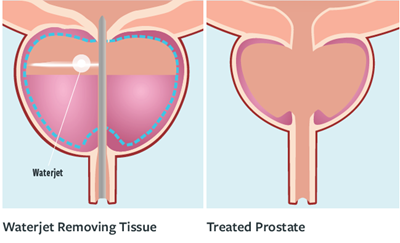
This depiction in Step 2, is for illustrative purposes only and does not indicate clinical performance. Patient responses can and do vary.
What results can I expect?
Clinical studies have shown that Aquablation therapy offers significant symptom relief and low rates of irreversible complications, across prostates of all sizes and shapes.
It offers the following benefits;
- Improvement in the BPH Symptom Score
- Improved Flow of urine
- Patients will preserve; continence / erections and ejaculations (Elterman D. et al. Meta-analysis with individual data of functional outcomes following Aquablation for lower urinary tract symptoms due to BPH in various prostate anatomies. BMJ Surg Interv Health Technologies. 2021 Jun)
What to expect during aquablational therapy
Aquablation Therapy is a robotic surgical procedure. The surgical team will prepare you for the treatment prior to entering the operating room. The treatment itself will take less than an hour, typically 40 minutes. You will be required to stay in hospital for a few hours under observation and generally will require an overnight stay. You catheter will be assessed and typically removed 24 to 48hrs after the procedure.
What are the treatment options (including non-surgical) for enlarged prostate
Choosing a treatment option can be overwhelming, as it often forces men to compromise in some way. This could mean not responding well to medication, getting limited relief, having a long recovery time, or even having issues with sexual function.
Historically, patients have been lacking a reliable solution without a compromise to safety and efficacy. 60% of men do not tend to adhere to BPH medication in the long run, whilst resective surgical treatments yield better outcomes.
However, resective procedures such as TURP, or laser enucleation (HoLEP) may come with a higher rate of irreversible complications such as loss of sexual function and incontinence.
On the other hand, minimally invasive treatments such as Urolift and Rezum have a lower complication profile but with that may come a less durable treatment to relieve symptoms.
When is it recommended to have surgery for enlarged prostate?
If BPH symptoms are severe or don’t improve with medication, there is a number of treatments that doctors may suggest. However, 97% of men being treated by a urologist do not seek surgical intervention due to treatment option limitations [11] as 83% of men are not willing to sacrifice sexual function for symptom relief. Patients should talk to their doctor to determine if Aquablation therapy is right for them.
Can an enlarged prostate cause constipation?
An enlarged prostate typically affects urinary function. An enlarged prostate does not cause constipation.
Does enlarged prostate mean cancer?
BPH is not prostate cancer, It’s is a non cancerous enlargement of the prostate.
How to prevent prostate enlargement
Prostate enlargement is often a natural aging process and cannot be completely prevented. However, several lifestyle changes may help reduce the severity of BPH symptoms, including regular check-ups to determine any prostate issues early, physical activity, healthy diet, reducing or avoiding alcohol/caffeine.
Aquablation therapy cost
You will receive a formal quotation price following your consultation with one of our expert surgeons. This formal quote for your aquablation therapy will be valid for 60 days and includes unlimited aftercare.
Ramsay offer an all-inclusive Total Care package, where a single one-off payment at a pre-agreed price, delivering direct access to all the treatment you need for complete reassurance. You can also spread the cost of your treatment with finance options available.
The procedure may be covered by your medical insurance policy. We advise you to check directly with your insurance provider and get written confirmation before commencing treatment.
Questions to ask your consultant
- How big is my prostate, what is the measurement?
- Does my prostate have a lobe protruding into the bladder?
- Will I maintain sexual function and get significant symptom relief with medications or other procedures?
If you would like to read more about the technology and patients who have had this surgery using this technology, please visit: aquablation.com
We're here for you
If you need any further information, our friendly enquiry team are on hand to help. Contact us if you would like to speak to someone for further advice or to book a consultation.
References
NICE Medtech innovation briefing [MIB315] Published: 31 January 2023 https://www.nice.org.uk/advice/mib315/chapter/The-technology
NICE IPG629 Published: 19 Sept 2018 https://www.nice.org.uk/guidance/ipg629/chapter/2-The-condition-current-treatments-and-procedure#current-treatments
PROCEPT BioRobotics, Patient Information, visit: www.aquablation.com
NHS Website; Treatment of Benign Prostate Enlargement: https://www.nhs.uk/conditions/prostate-enlargement/treatment/
Launer BM, McVary KT, Ricke WA, Lloyd GL. The rising worldwide impact of benign prostatic hyperplasia. BJU Int. 2021 Jun;127(6):722-728. doi: 10.1111/bju.15286. Epub 2020 Nov 21. PMID: 33124118; PMCID: PMC8170717.
Gilling PJ, Barber N, Bidair M, et al. Five-year outcomes for Aquablation therapy compared to TURP: results from a double-blind, randomized trial in men with LUTS due to BPH. Can J Urol. 2022;29(1):10960-10968
Leong JY, Patel AS, Ramasamy R. Minimizing sexual dysfunction in BPH surgery. Curr Sex Health Rep. 2019;11(3):190-200.
Comiter et al. Urinary incontinence after prostate treatment. Up to Date; Last update May 2020
Sapetti J, Sakat J, Saad E, et al. Urinary incontinence after HOLEP: Incidence, evolution and predictive factors. Prog Urol. 2019;29(2):101-107
Khera, M. Simple Prostatectomy. Medscape. 2018.
(11.Vuichoud C, Loughlin KR. Benign prostatic hyperplasia: epidemiology, economics and evaluation. Can J Urol. 2015;22(suppl1):1-6. )
